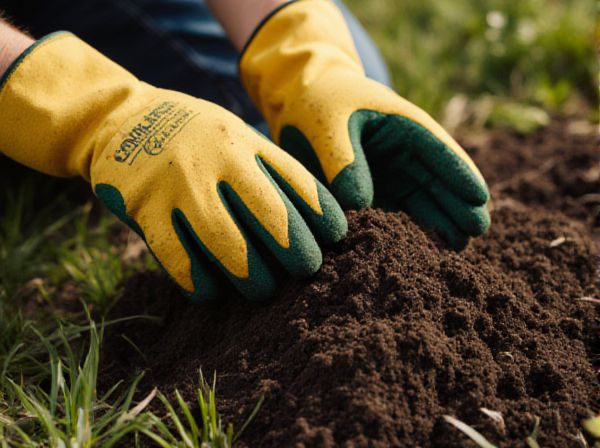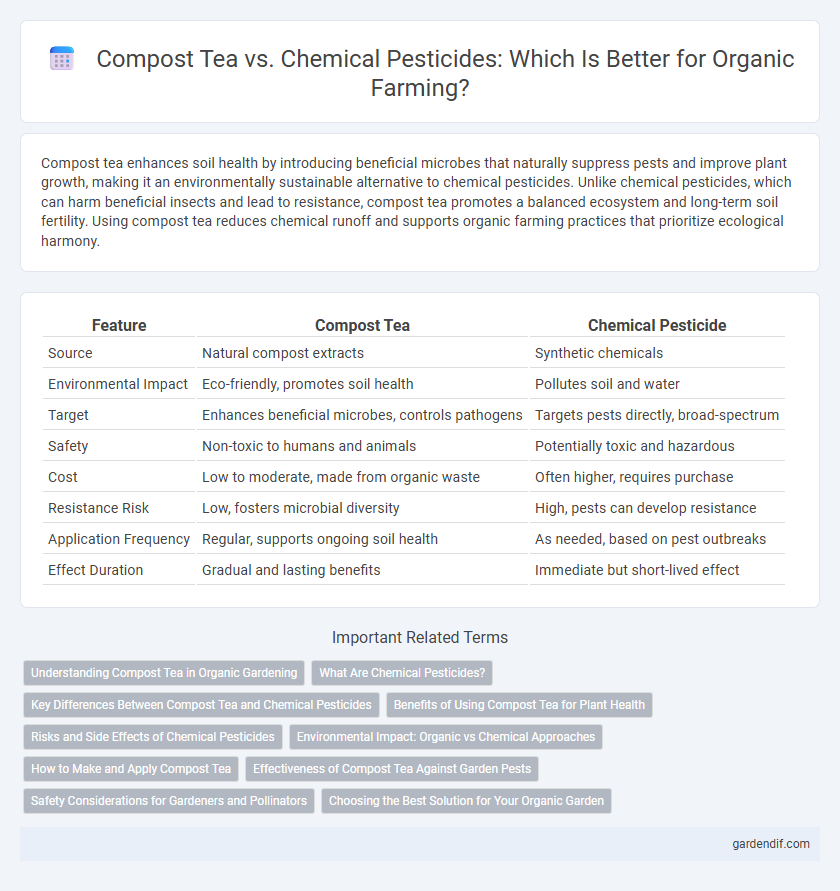
Compost tea vs Chemical pesticide Illustration
Compost tea enhances soil health by introducing beneficial microbes that naturally suppress pests and improve plant growth, making it an environmentally sustainable alternative to chemical pesticides. Unlike chemical pesticides, which can harm beneficial insects and lead to resistance, compost tea promotes a balanced ecosystem and long-term soil fertility. Using compost tea reduces chemical runoff and supports organic farming practices that prioritize ecological harmony.
Table of Comparison
| Feature | Compost Tea | Chemical Pesticide |
|---|---|---|
| Source | Natural compost extracts | Synthetic chemicals |
| Environmental Impact | Eco-friendly, promotes soil health | Pollutes soil and water |
| Target | Enhances beneficial microbes, controls pathogens | Targets pests directly, broad-spectrum |
| Safety | Non-toxic to humans and animals | Potentially toxic and hazardous |
| Cost | Low to moderate, made from organic waste | Often higher, requires purchase |
| Resistance Risk | Low, fosters microbial diversity | High, pests can develop resistance |
| Application Frequency | Regular, supports ongoing soil health | As needed, based on pest outbreaks |
| Effect Duration | Gradual and lasting benefits | Immediate but short-lived effect |
Understanding Compost Tea in Organic Gardening
Compost tea is a nutrient-rich, biologically active liquid brewed from organic compost, enhancing soil fertility and promoting beneficial microbial life in organic gardening. Unlike chemical pesticides that target pests with synthetic toxins, compost tea supports plant health by improving soil structure and boosting natural disease resistance. This sustainable approach reduces chemical dependency and fosters a balanced ecosystem essential for organic crop production.
What Are Chemical Pesticides?
Chemical pesticides are synthetic substances designed to eliminate or control pests, including insects, weeds, and fungi, by disrupting their biological processes. These substances often contain active ingredients such as organophosphates, neonicotinoids, or pyrethroids, which can persist in the environment and potentially harm beneficial organisms and soil health. In contrast, organic alternatives like compost tea promote natural pest resistance and soil fertility without introducing harmful chemicals.
Key Differences Between Compost Tea and Chemical Pesticides
Compost tea nourishes soil microbiology by introducing beneficial microorganisms that enhance plant health and disease resistance naturally, while chemical pesticides primarily target pests with synthetic toxins that can disrupt soil ecosystems. The organic nature of compost tea promotes sustainable agriculture through improved soil structure and nutrient availability, contrasting with chemical pesticides that may cause environmental contamination and pest resistance. Compost tea's effectiveness increases over time by fostering a balanced ecosystem, whereas chemical pesticides often require repeated applications due to their transient pest control effects.
Benefits of Using Compost Tea for Plant Health
Compost tea enhances plant health by supplying beneficial microorganisms that improve soil fertility and nutrient uptake, reducing the need for synthetic chemicals. Its natural enzymes and microbes suppress harmful pathogens, promoting disease resistance without damaging the ecosystem. Unlike chemical pesticides, compost tea supports sustainable growth and long-term soil vitality, fostering a balanced and resilient garden environment.
Risks and Side Effects of Chemical Pesticides
Chemical pesticides pose significant risks including soil degradation, water contamination, and harm to beneficial insects such as pollinators. Exposure to these chemicals can lead to human health issues like respiratory problems and skin irritations. In contrast, compost tea promotes plant health naturally without introducing toxic substances or persistent environmental hazards.
Environmental Impact: Organic vs Chemical Approaches
Compost tea promotes soil biodiversity and enhances plant health without introducing harmful chemicals, making it an environmentally sustainable alternative to chemical pesticides. Chemical pesticides, while effective for pest control, often result in soil degradation, water contamination, and harm to beneficial insects and wildlife. Organic methods like compost tea support long-term ecosystem balance by reducing chemical runoff and preserving natural habitats.
How to Make and Apply Compost Tea
Compost tea is made by steeping mature compost in water, often aerated for 24-48 hours to enhance beneficial microbial growth, creating a nutrient-rich liquid that promotes plant health and disease resistance. To apply, spray the compost tea directly onto plant leaves and soil, ensuring thorough coverage to suppress pathogens and improve soil microbial diversity. Unlike chemical pesticides, compost tea supports sustainable agriculture by enriching soil biology and reducing toxic chemical use.
Effectiveness of Compost Tea Against Garden Pests
Compost tea enhances plant health by introducing beneficial microorganisms that suppress garden pests and diseases more sustainably than chemical pesticides. Unlike synthetic chemicals, compost tea promotes a balanced ecosystem in the soil, reducing pest populations without harmful residues. Studies show that regular application of compost tea can improve pest resistance by increasing plant immunity and microbial diversity in the garden environment.
Safety Considerations for Gardeners and Pollinators
Compost tea offers a safer alternative to chemical pesticides by minimizing toxic residue that can harm gardeners and pollinators such as bees and butterflies. Its natural microbial content supports plant health without disrupting beneficial insect populations or contaminating soil and water systems. Chemical pesticides often pose risks of poisoning and ecological imbalance, making compost tea a more environmentally responsible choice.
Choosing the Best Solution for Your Organic Garden
Compost tea enriches soil biology by introducing beneficial microorganisms that enhance plant health and nutrient uptake, making it an ideal choice for organic gardens. Chemical pesticides often harm beneficial insects and disrupt soil ecology, posing risks to long-term garden sustainability. Opting for compost tea supports natural pest resistance and promotes a balanced ecosystem, crucial for thriving organic cultivation.
Compost tea vs Chemical pesticide Infographic

 gardendif.com
gardendif.com